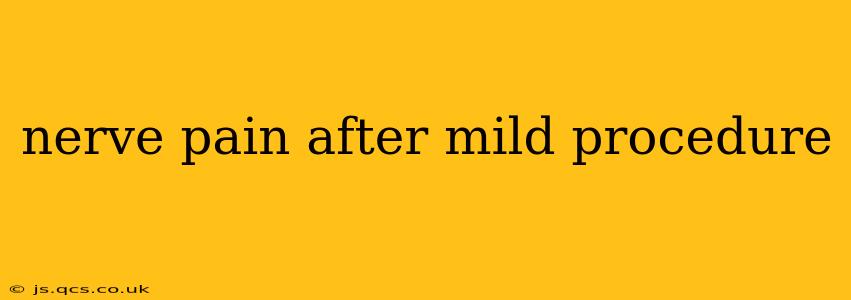Experiencing nerve pain after a seemingly minor medical procedure can be frustrating and concerning. While many procedures are low-risk, the possibility of nerve irritation or damage exists, even with minimally invasive techniques. This comprehensive guide explores potential causes, effective management strategies, and when to seek further medical attention.
What Causes Nerve Pain After a Minor Procedure?
Nerve pain, or neuralgia, following a minor procedure can stem from several factors. It's not always a sign of something serious, but understanding the possibilities is crucial for appropriate management.
-
Direct Nerve Injury: Although rare in mild procedures, direct trauma to a nerve during the procedure itself is a possibility. This can happen if the nerve is inadvertently touched, stretched, or compressed by instruments. The severity depends on the type and extent of the injury.
-
Inflammation and Swelling: The body's natural inflammatory response to the procedure can sometimes put pressure on nearby nerves, leading to pain. This is often temporary and resolves as the inflammation subsides.
-
Entrapment: Scar tissue formation after the procedure might compress a nerve, causing ongoing pain. This is more likely with procedures involving incisions or injections near nerves.
-
Referred Pain: The pain you experience might not originate from the site of the procedure. Nerves can transmit pain signals to areas far from the initial source, making it difficult to pinpoint the exact cause.
-
Pre-existing Conditions: Underlying nerve conditions or previous nerve damage can be exacerbated by even a mild procedure, leading to increased pain.
How Long Does Nerve Pain After a Minor Procedure Last?
The duration of nerve pain varies greatly depending on the cause and individual factors. Mild inflammation-related pain might subside within a few days to a couple of weeks. However, pain resulting from nerve injury or entrapment can persist for much longer, sometimes requiring several months or even longer for complete resolution.
What Can I Do to Relieve Nerve Pain at Home?
Several home remedies can help manage nerve pain:
-
Rest: Avoid activities that aggravate the pain. Rest allows your body to heal and reduces stress on the affected area.
-
Ice and Heat: Applying ice packs for 15-20 minutes at a time can reduce inflammation in the initial stages. After a few days, gentle heat application might help soothe the affected area.
-
Over-the-Counter Pain Relief: Nonsteroidal anti-inflammatory drugs (NSAIDs) like ibuprofen or naproxen can help manage pain and inflammation. Acetaminophen (paracetamol) can help with pain but doesn't address inflammation. Always follow the recommended dosage.
-
Gentle Movement: Once the initial inflammation subsides, gentle movement and stretching can help prevent stiffness and promote healing. Avoid strenuous activities.
-
Lifestyle Modifications: Ensure adequate sleep, manage stress, and maintain a healthy diet to support your body's natural healing processes.
When Should I See a Doctor About Nerve Pain After a Procedure?
It's crucial to consult your doctor if:
- The pain is severe or doesn't improve after a week or two of home remedies.
- The pain is spreading or getting worse.
- You experience numbness, tingling, or weakness in the affected area.
- You have pre-existing nerve conditions.
- You develop signs of infection, such as redness, swelling, or pus.
What Treatments Are Available for Persistent Nerve Pain?
If home remedies fail to provide relief, your doctor might recommend various treatments, including:
-
Prescription Medications: Stronger pain relievers, anticonvulsants, or antidepressants might be prescribed to manage chronic nerve pain.
-
Physical Therapy: A physical therapist can teach you exercises and stretches to improve mobility, reduce pain, and prevent stiffness.
-
Injections: Corticosteroid injections can help reduce inflammation around the nerve.
-
Other Interventions: In rare cases, more invasive procedures like surgery might be necessary to address nerve compression or damage.
Can Nerve Damage From a Minor Procedure Be Permanent?
In most cases, nerve pain after a minor procedure resolves without long-term consequences. However, severe nerve damage is possible, though less likely with minor procedures. The potential for permanent nerve damage depends on the severity of the injury, the location of the nerve, and the individual's healing response. Early medical attention significantly increases the chances of a positive outcome.
This information is for general knowledge and does not constitute medical advice. Always consult with a healthcare professional for diagnosis and treatment of any medical condition.
